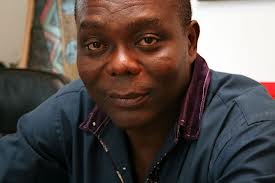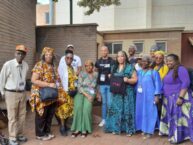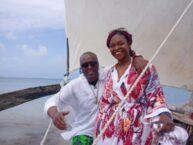 Uzor Maxim Uzoatu started out as a rural peasant theatre director before venturing into journalism. He was the 1989 Distinguished Visitor at the Graduate School of Journalism, University of Western Ontario, Canada and was nominated for the Caine Prize for African Writing in 2008 for his short story “Cemetery of Life” published in Wasafiri magazine. Although Maxim has published three novels, he is best known as a poet in the Nigerian literati.
Uzor Maxim Uzoatu started out as a rural peasant theatre director before venturing into journalism. He was the 1989 Distinguished Visitor at the Graduate School of Journalism, University of Western Ontario, Canada and was nominated for the Caine Prize for African Writing in 2008 for his short story “Cemetery of Life” published in Wasafiri magazine. Although Maxim has published three novels, he is best known as a poet in the Nigerian literati.
“It is the duty of the poet to dare the immortals by imbuing phantoms with flesh and blood.”
The Interview
Uche Peter Umez: Delmore Schwartz referred to the poet as “a kind of priest”, while Robert Graves viewed the function of poetry as the “religious invocation of the Muse.” Why does poetry lend itself to religious representations? Is there anything divine about poetry? How do you explain the spiritual urgency in your debut collection, God of Poetry? And why the title God of Poetry?
Uzor Maxim Uzoatu: Writing poetry is the one occupation that gives me spiritual satisfaction. It entails going deeper than the depths to garner the sound in meaning. This entails being at one with the gods. In the sublime realms truth is the one element that strikes the balance. There is no room for mundane affectation. I am the god of poetry because of the simple fact that I came into existence before the Muses. Yes, as my line says it: “I antedate the Muses.” Man originated from Africa, and I happen to be that aboriginal man laden with verbal terrorism. When African poets pander to European mores as the source I feel quite strongly that they lack the vital connection to the roots. The divination of the sacred word is here. Operating from the pristine lore one then accumulates all the other wider worlds into a canon that accommodates the diversities of humankind. My poetry can therefore not be seen in its separateness, but in the seamless knitting together of the polar fabrics of humanity onto divinity.
Uche Peter Umez: The collection is structured along this pattern – God of Poetry, Invocation, Intimation, Destination and Divination – as if it is foreshadowing a rite of passage, in which the initiate is set to receive “the idol of the word” from his god. Why is your poetry replete with ritualistic imagery, with terror and foreboding? Why the tone? And what effect do you intend it to have on the reader?
Uzor Maxim Uzoatu: Poetry is a search that never ends. The ritual of passage entails gathering all the hidden truths in the zones of the here and now, the vaults of the ancestors, and the seeds in the wombs questing to be born. Birth pangs can be bloody and indeed painful, but one must perforce brave through the pains in the spirited dare toward harmony. The dread of existence yields to the din of silence in the melding of words and worlds aimed at transcending beyond page and stage. In the end poetry goes way ahead of just being an object of detached appreciation into the very essence of being. The ambience of the poem matters a lot to me, for I am a man of moods. If the mood does not sound right, then there is no poem. The reader gets to grips with the burden of the poet through language that churns the mind and enters into hidden spaces.
Uche Peter Umez: Your poetry is very distinctive in language, and sincerely I am taken by phrases such as “godlings of godsmiths”, “shadow of pagan poverty”, “wasp of the rotten vulva”, “Naomi Campbell of the natives”, and “Byronic griot of Negritude.” How did you arrive at such stunning descriptions? How do you approach poetry – the act itself? How do you decide what word or phrase best fits a poem? What would you consider most intrinsic to the making of an effective phrase?
Uzor Maxim Uzoatu: For me the first line is the spur. Then language engages sound in a dance that sings on the page. The words come from everywhere jostling for space, and one must of necessity murder some darlings. The word may sound great but does not fit into the cosmos of the canto. The expression, no matter how beautiful, is of course sacrificed to the greater glory of the poem as a harmonious whole. The phrases you have pointed out as holding your attention are only there because they somewhat lend verisimilitude to the entire poems in which they appear. The mighty line is not independent of the poem. For instance, in one of my poems which the editors of an elite magazine chose for publication there is the phrase “fucking sudden death”. A lady staff of the magazine took exception to the “fucking” in the matter. I would rather not be published than pander to the whims of prize-givers. By the way, the phrase referred to the passing on of the Nigerian dictator who expired in action quite suddenly atop Indian apples!
Uche Peter Umez: In the poem, “The Witch at Dawn” you paint a grotesque picture, in which anyone may be tempted to conjure up the image of a Medusa, while in “Kindred Spirit” you describe a bizarre encounter at the cemetery. Can you tell us about your relation to these poems?
I cut myself into pieces
Into marginal morsels
With the gnarled axe
On the feathered slab.
*
I ate myself with cannibals
At the birthnight banquet.
Uzor Maxim Uzoatu: In the fields that I plough there are multiform mysteries. The dead can pop up for a quick drink, and indeed all things are possible within the atmospheric sphere of the poem. The Christian of course is a cannibal eating the body of Christ. The initiation within animist moieties would in the course of time get juxtaposed with, say, a Catholic taking Holy Communion which means the eating of Christ’s body. From the cemetery to the higher heavens, one is destined to encounter all makes of spirits, goblins and muses if you like. It is the duty of the poet to dare the immortals by imbuing phantoms with flesh and blood. It is in making sense of the admixture that the living poem is birthed.
Uche Peter Umez: Somehow, I found myself thinking of some surreal poems by Tchicaya U Tam’si and Rabearivelo after I had read the first eight pages of your collection and how pleased I was when I noticed you sort of paid tribute to both of them in the poem titled “World Poetry”. Were they literary influences? If so, what attracted you to their kind of poetry?
Uzor Maxim Uzoatu: A mark of initiation for any aspiring poet is to venture into the covens of the “Dead Poets Society”. It is only when you come out of there alive that you can hold your head high as having been ordained by the dead masters. Tchicaya U Tam’si and Rabearivelo as you have pointed out knocked me very hard on the head when I entered into the society. The surrealistic flow of their works was a joy to behold. Just let the words flow, they commanded me with their occult voices, and I could not but obey. Of course they were not alone, because all the other dead poets, from Europe, China, India, America, Africa, anywhere, all the dead poets stole into my skull. Of course I’m not forgetting the living poets, even my contemporaries. All the riffs are grist to the mill.
Uche Peter Umez: Regarding the quasi-mystical quality in your poetry, don’t you think poetry should reflect the idiom and language of the times, of our lives? Imbuing your poetry with such private, Soyinkaseque language will it not alienate those with little or no poetic sensibility?
Uzor Maxim Uzoatu: Look, people must grow. A student is expected to pass his exams and get into the next class. For instance, I grew from enjoying nursery rhymes before venturing into the poems of the masters such as Shakespeare, Pope, Yeats, Eliot, Okigbo and so on. Even so, there are different ranges of language in my poetry, say: At the shrine,/God is a common man,/A tramp on trumpet/Blowing past span and season/Into the marrow of time. There is no big grammar here, or is there? The poems fit the moods of the times. One must not sacrifice the weight of the matter at hand on the altar of simplicity of style to please the multitudes.
Uche Peter Umez: Many of your poems deal with the themes of “birth and being”, “death and transition”. What attracts you to such themes? Is your poetic imagination derived from your faith? Is poetry a journey towards understanding the link between the spiritual and physical world?
Uzor Maxim Uzoatu: Of beginnings and ends there is continuity. Otherworldliness remains a challenge that needs to be mastered. If we are only concerned with what we can see and feel, then life will be all too boring. Transiting into the deeper spaces imbues poetry with sublimity that resonates beyond the page. The mythical is not just there as a sphere beyond the reach of man. Instead myth is deployed positively to serve the purposes of lived life. I was born into the Catholic Church, for instance, but the drive toward acculturation makes it crucial that traditional rites must not be put on one side. Faith in the end becomes many-sided, incorporating all the world’s comparative humanities.
Uche Peter Umez: I am just curious: why did it take you so long to publish your debut collection, even when many of us in the Nigerian literary circle had expected you to have had it published a decade or two ago. Moreover, there is this story that you stubbornly refused all appeals to publish your collection – not until in 2006. Can you say a few words about this? Did you feel that your poetry was not good enough for the public at any point? Will there be a second collection?
Uzor Maxim Uzoatu: I could have published my poetry back in the secondary school, or at the university. Okot p’Bitek, the Ugandan author of Song of Lawino who was my teacher and friend at the then University of Ife actually planned to take me to Makerere University in his native Uganda to launch me as the other poetic force other than him! Sadly, Okot died in 1982. Dennis Brutus of South Africa wanted to publish my poems and his together. In fact Brutus suggested we publish a volume of erotica! It was not a case of feeling that my verses were not up to par for the public. There are hardly liquid publishers for poetry anywhere in the world. Let me exclusively reveal to you a recent mail from my former agent, Neil Hornick: “My failure to get you published in Britain remains one of the great disappointments of my time with Radala & Associates literary agency.” I have many collections inside my skull, in some lockers, and in some computers. Many of my poems went with the fire that razed my library the other time. But as my late friend Dennis Brutus would write, “Somehow we survive.” A second collection is long overdue. It shall soon manifest between a front and back cover.
Uche Peter Umez: John Ashberry said, “We are all confessional poets sometimes”, what’s your reaction to this in light of your poem titled “Guerilla Journalist”? As a journalist, do you think journalism offers any advantage to the poet in you? Finally, what is your definition of a poem? What is your aim of writing poetry?
Uzor Maxim Uzoatu: Confession in the sense of unearthing the truth from the deepest regions of the soul strikes at the very heart of poetry. It is not confession of the girlie magazine stuff. My time as a guerrilla journalist in the dangerous days of the Abacha dictatorship marked the triumph of commitment over compromise. The poet was quite determined to pay the supreme price. In short I’m surprised I’m still here. Journalism is quite addictive, like a drug, but poetry trumps all. Journalism helps to the bills, poetry lifts the spirits. Poetry is too sublime to be caged into a mundane definition. Writing poetry is divinity.
Uche Peter Umez is a poet and short fiction writer. An Alumnus of the International Writing Program (USA), Uche has participated in residencies in Ghana, India, Switzerland and Italy. He has twice been shortlisted for the Nigeria Prize for Literature in 2007 and 2011, and was one of the winners in the Commonwealth Short Story Competition in 2006 and 2008 respectively. His latest children’s books The Boy who Throw Stones at Animals and Other Stories and Tim the Monkey and Other Stories have just been published by Melrose Books and Africana First Publishers (Nigeria) respectively.





